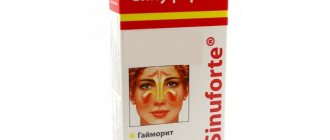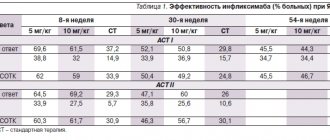Pharmacological properties of the drug Allokin-alpha
Pharmacodynamics. Alloferon is an oligopeptide. Alloferon is an effective inducer of the synthesis of endogenous alpha and gamma interferons and an activator of the natural killer system. The drug stimulates the recognition and lysis of defective cells by cytotoxic lymphocytes. During the experiments, the drug was found to be highly effective against infections caused by influenza A and B viruses, hepatitis B, and herpes. Alloferon does not cause general toxicity, allergic reactions, does not exhibit mutagenic, carcinogenic or embryotoxic effects, and does not affect reproductive function. Pharmacokinetics. After penetration into the systemic bloodstream, it interacts with immunocompetent cells, after which the detection of alloferon is difficult due to the close structural affinity of its metabolites with serum proteins. An increase in interferon levels is observed 2 hours after administration of the drug and remains at a high level (2–2.5 times higher than the usual background) for 6–8 hours, reaching the initial values by the end of the day. Increased functional activity of natural killer cells is observed for 7 days after administration of the drug.
ALLOKIN-ALFA lyophilisate for the preparation of solution for subcutaneous administration 1 mg No. 6
Allokin-alpha is an antiviral drug, a selective stimulator of the activity of natural immunity factors. Allokin-alpha is created on the basis of an artificially synthesized oligopeptide alloferon, which is similar in pharmacological action to alpha-interferon and is the main link in the antiviral defense of insects. Belongs to the group of antiviral drugs that “inhibit the shutdown of cytokines.” Allokin-alpha acts as a cofactor for the activation of the immune response, the formation of which requires the participation of the main signal - the viral antigen, which makes it possible to localize the effect of the drug at the site of inflammation, avoiding excessive reactions of the immune system beyond its boundaries. Allokin-alpha acts at the site of viral infection without activating the entire cascade of immunological reactions of the body. Allokin-alpha is an effective inducer of the synthesis of endogenous interferons and an activator of the natural killer system (NK or NK cells). Capable of stimulating the recognition and lysis of defective cells by cytotoxic lymphocytes. Helps restore the functional activity of T-cell immunity. Among the early reactions of the immune system to Allokin-alpha, an important place is occupied by the induction of interferon synthesis, which is most pronounced against the background of a viral infection. Allokin-alpha acts as a cofactor, allowing alpha-interferon-producing leukocytes to effectively respond to the main signal - the viral antigen. However, the induction of interferon synthesis occurs under the influence of the virus, and is not caused by the action of Allokin-alpha. This important feature underlies the specificity of the drug’s action - the production of this important cytokine occurs only in places of active viral replication. This reduces the risk of undesirable consequences of a generalized nonspecific response that occurs when using immunomodulatory drugs. Allokin-alpha enhances the production of interferon-gamma by NK cells in response to stimulation by interleukin-12. Allokin-alpha improves the recognition of virus-infected cells by NK cells, increases the cytotoxicity and functional activity of NK cells. Under the influence of Allokin-alpha, there is an increase in the expression of killing-activating receptors of NK cells, an improvement in the recognition of cells affected by the virus and their lysis, and an increase in the production of cytokines (interferon-alpha, interferon-gamma, interleukin-1, interleukin-2, lymphotoxin). Allokin-alpha promotes the expression of cytokine genes and, accordingly, increases the production of interleukin-6, interleukin-10, as well as interleukin-12 and interleukin-18. NK cells recognize virus-infected cells using killing-activating receptors, the expression of which increases under the influence of Allokin-alpha. An increase in interferon concentration is observed 2 hours after the administration of Allokin-alpha and remains at a high level (2-2.5 times higher than the usual background) for 6-8 hours with a decrease to initial values by the end of the day. Increased functional activity of natural killer cells is observed within 7 days after the administration of Allokin-alpha. Experiments have demonstrated high effectiveness against infections caused by influenza A and B viruses, hepatitis C, and herpes. When treating genital herpes, Allokin-alpha eliminates pain and burning within several hours after the first injection, increases the period of remission by an average of 2 times, reduces the period of relapse by 2 times (from 6 days before treatment to 3 days during and after treatment) . Allokin-alpha is used in the treatment of papillomavirus infection with such manifestations as cervical erosion, condylomas, papillomas, flat and plantar warts. In more than 90% of cases of treatment of cervical erosion, the removal of the human papilloma virus from the body is observed. Effective for preventing the development of dysplasia and cervical cancer. After treatment with Allokin-alpha, manifestations of human papillomavirus infection disappear without additional surgical procedures if the above manifestations arose no earlier than 6 months before the start of treatment. Earlier neoplasms require an integrated approach to treatment using Allokin-alpha and destructive treatment methods. Allokin-alpha does not have general toxicity, does not have a hepato-nephrotoxic effect and toxic effect on the hematopoietic organs, a negative effect on indicators of immune and interferon status, does not have allergenic properties, mutagenic and carcinogenic effects, does not have an embryotoxic effect, does not affect reproductive function , does not cause addiction, does not have a cumulative effect, does not form resistant (resistant) forms of viruses. Does not have severe side effects. Based on preclinical and clinical studies, Allokin-alpha is recognized as meeting the highest requirements for drug safety. This does not exclude the possibility of individual intolerance to Allokin-alpha in some patients and the need for medical supervision over the course of treatment.
Use of the drug Allokin-alpha
Enter s.c. To prepare the solution for injection, 0.9% sodium chloride solution is used as a solvent. When administering the drug subcutaneously, use 1 ml of solvent. Herpetic infection. The standard course of treatment for recurrent herpes infection includes injections of the drug at a dose of 1 mg subcutaneously every other day, a total of 3 injections per course. In case of insufficient effectiveness and in the absence of significant side effects, the next time the infection relapses, it is recommended to prescribe injections at a dose of 1 mg every other day, for a total of 6–9 injections per course. Hepatitis. In the treatment of moderate acute hepatitis B, the drug is administered after confirmation of the diagnosis at a dose of 1 mg 3 times a week for 3 weeks (9 injections in total). In case of a milder course of the disease, the drug is administered according to the same scheme.
Allokin-alpha, 6 pcs., 1 mg, lyophilisate for solution for injection
Allokin-alpha is an antiviral drug, a selective stimulator of the activity of natural immunity factors. Allokin-alpha is created on the basis of an artificially synthesized oligopeptide alloferon, which is similar in pharmacological action to alpha-interferon and is the main link in the antiviral defense of insects. Belongs to the group of antiviral drugs that “inhibit the shutdown of cytokines.” Allokin-alpha acts as a cofactor for the activation of the immune response, the formation of which requires the participation of the main signal - the viral antigen, which makes it possible to localize the effect of the drug at the site of inflammation, avoiding excessive reactions of the immune system beyond its boundaries. Allokin-alpha acts at the site of viral infection without activating the entire cascade of immunological reactions of the body. Allokin-alpha is an effective inducer of the synthesis of endogenous interferons and an activator of the natural killer system (NK or NK cells). Capable of stimulating the recognition and lysis of defective cells by cytotoxic lymphocytes. Helps restore the functional activity of T-cell immunity. Among the early reactions of the immune system to Allokin-alpha, an important place is occupied by the induction of interferon synthesis, which is most pronounced against the background of a viral infection. Allokin-alpha acts as a cofactor, allowing alpha-interferon-producing leukocytes to effectively respond to the main signal - the viral antigen. However, the induction of interferon synthesis occurs under the influence of the virus, and is not caused by the action of Allokin-alpha. This important feature underlies the specificity of the drug’s action - the production of this important cytokine occurs only in places of active viral replication. This reduces the risk of undesirable consequences of a generalized nonspecific response that occurs when using immunomodulatory drugs. Allokin-alpha enhances the production of interferon-gamma by NK cells in response to stimulation by interleukin-12. Allokin-alpha improves the recognition of virus-infected cells by NK cells, increases the cytotoxicity and functional activity of NK cells. Under the influence of Allokin-alpha, there is an increase in the expression of killing-activating receptors of NK cells, an improvement in the recognition of cells affected by the virus and their lysis, and an increase in the production of cytokines (interferon-alpha, interferon-gamma, interleukin-1, interleukin-2, lymphotoxin). Allokin-alpha promotes the expression of cytokine genes and, accordingly, increases the production of interleukin-6, interleukin-10, as well as interleukin-12 and interleukin-18. NK cells recognize virus-infected cells using killing-activating receptors, the expression of which increases under the influence of Allokin-alpha. An increase in interferon concentration is observed 2 hours after the administration of Allokin-alpha and remains at a high level (2-2.5 times higher than the usual background) for 6-8 hours with a decrease to initial values by the end of the day. Increased functional activity of natural killer cells is observed within 7 days after the administration of Allokin-alpha. Experiments have demonstrated high effectiveness against infections caused by influenza A and B viruses, hepatitis C, and herpes. When treating genital herpes, Allokin-alpha eliminates pain and burning within several hours after the first injection, increases the period of remission by an average of 2 times, reduces the period of relapse by 2 times (from 6 days before treatment to 3 days during and after treatment) . Allokin-alpha is used in the treatment of papillomavirus infection with such manifestations as cervical erosion, condylomas, papillomas, flat and plantar warts. In more than 90% of cases of treatment of cervical erosion, the removal of the human papilloma virus from the body is observed. Effective for preventing the development of dysplasia and cervical cancer. After treatment with Allokin-alpha, manifestations of human papillomavirus infection disappear without additional surgical procedures if the above manifestations arose no earlier than 6 months before the start of treatment. Earlier neoplasms require an integrated approach to treatment using Allokin-alpha and destructive treatment methods. Allokin-alpha does not have general toxicity, does not have a hepato-nephrotoxic effect and toxic effect on the hematopoietic organs, a negative effect on indicators of immune and interferon status, does not have allergenic properties, mutagenic and carcinogenic effects, does not have an embryotoxic effect, does not affect reproductive function , does not cause addiction, does not have a cumulative effect, does not form resistant (resistant) forms of viruses. Does not have severe side effects. Based on preclinical and clinical studies, Allokin-alpha is recognized as meeting the highest requirements for drug safety. This does not exclude the possibility of individual intolerance to Allokin-alpha in some patients and the need for medical supervision over the course of treatment.
Special instructions for the use of the drug Allokin-alpha
It is recommended to start treatment when the first signs of the disease appear; for hepatitis B, no later than the 7th day from the onset of symptoms of jaundice. In acute hepatitis B, the drug is prescribed as part of generally accepted basic therapy. In the treatment of chronic recurrent genital herpes, it can be prescribed in combination with antiviral drugs. Use during pregnancy and lactation . During pregnancy and breastfeeding, the use of the drug is contraindicated. Children. The use of the drug is contraindicated for children under 18 years of age. The ability to influence the reaction rate when driving a vehicle or working with other mechanisms. During treatment, care must be taken when driving vehicles and engaging in other potentially hazardous activities that require increased concentration and speed of psychomotor reactions, since some patients may experience dizziness.



